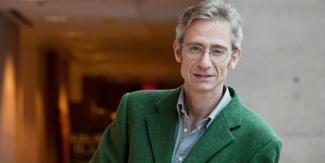
Who are you and what do you do?
Fabio Rossi, Md PhD, I study tissue regeneration and how sometimes it goes wrong, which leads to the development of fibrosis. Fibrosis is a major complication of chronic and age-related disease, and it is thought to be involved in ~45% of deaths in western society.
When did you begin working at UBC?
In 2001, just after my postdoc at Stanford
What motivates you personally to undertake your research?
Curiosity and fascination with how biological systems work. Curing disease, improving quality of life and stimulating the economy are welcome side-effects
When did you know you were going to focus on this area? What was your "aha!" moment?
When I realized that at the age of 40 an individual takes 4 times as long to repair any damage compared to a 20 years old.
What is the ultimate goal of your research program?
To understand how the different cell types involved in restoring function after damage work together. A side effects of gaining that knowledge is that we can improve the process and prevent its breakdown in disease.
How does your work with animals advance the research you are doing?
Tissue regeneration and its failure in disease can only be observed in vivo. By altering or getting rid of specific cell types involved in this process we learn what they do and how they influence other cells
Why is the use of animals necessary in your research?
The only system in which the different players (cell types) involved in regeneration can be observed working together, is the in vivo animal. This is because we are completely unable to mimic things such as the different waves of inflammatory cells that invade the tissue at specific times during regeneration. Once we understand how they communicate with each other to achieve their common goal of repairing damage, we may be able to model this in vitro or even on a computer. We are decades away from having the necessary knowledge.
Outside of your research, if I want to engage you in conversation, what should I ask you about?
Conspiracy theories about UBC’s upper administration politics… joking! Actually sailing, skiing and science fiction literature.
Research involving animals can be an emotive topic. What do you say to people who are unsure how to feel about it?
I try to explain how indispensable it is, but this rarely has an impact when emotions are involved. I then point out that we take extreme care to avoid any unnecessary suffering, and point out the benefits that came from animal research and that are already available to people. Most people will agree that there is a benefit worth the ethical price.